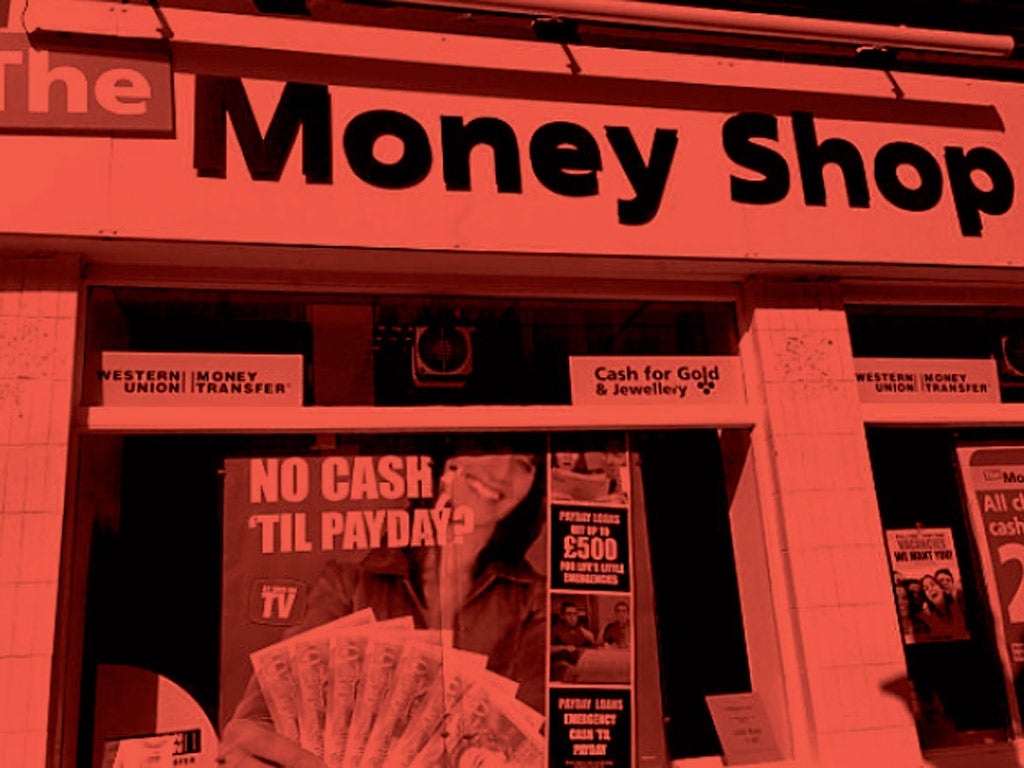Red alert on pay-day loans
As the economic climate worsens, millions are resorting to high-interest short-term borrowing to make ends meet. Nina Lakhani reports on a social time bomb

Steve Perry, 30, a low-paid admin worker from Wigan, wanted £250 to go away for a long weekend with friends to the Lake District. His bank refused to extend his overdraft or authorise a loan. But a quick internet search turned up a pay-day loan company, which agreed to lend him £250 for two weeks, no questions asked.
Eighteen months later, he had 64 loans from 12 different companies worth £15,000, having borrowed and borrowed short-term, high-interest loans to avoid defaulting. He was in a spiral of debt.
Nightmare debt stories like Steve's are expected multiply as a perfect storm of falling wages, rising prices and lax regulation means a staggering 3.5million Britons are likely to take out a high-interest pay-day loan in the next six months, show a survey published by R3, the Association of Business Recovery Professionals.
Many will borrow from American "legal loan sharks" circling in some of the most deprived parts of the UK, pushing loans that charge up to 5,000 per cent to millions of people turned away by high street banks.
US pay-day loan firms such as Speedy Cash are increasingly entering Britain's relatively unregulated market. DFC Global, which owns The Money Shop and two internet lenders, is now the UK's biggest pay-day lender by market share. In 1992, it had just one store in the UK, but by 2009 there were 273; last year it announced plans for a further 800.
Now, about half of all UK households regularly struggle to make money last till the next pay day. The watchdog, Consumer Focus, will today warn that changes made by major banks to basic bank accounts could push more consumers out of the banking system.
The pay-day loan industry, both home-grown and American, has lent British consumers between £1.7bn and £1.9bn last year, compared to £500m in 2007. The industry has filled a growing gap left as banks say no to "high-risk" or low-income customers. On top of that, more than a million adults in the UK do not have a bank account. The industry is among few to have benefited as a result of the financial crisis.
A survey by Debt Advice Foundation found online searches for pay-day loans have doubled in the past 12 months. Citizens Advice Bureau reports a four-fold increase in the number of people with payday loans coming for debt advice in the first quarter of this year, compared to two years ago. Debt charities and consumer groups are calling for stricter controls such as caps on fees and limit rollovers and repeated loans.
At least 35 US states and 15 European countries have introduced legal restrictions. In Arizona, the maximum fee is 15 per cent of the total loan amount, and it cannot be more than £500 in a three-rollover period.
MPs demand similar action. David Lammy, MP for Haringey, said: "The damage being done to families and communities by payday loan sharks is hard to fathom, and that the government has not sought to curb this excess, is extraordinary. This is a completely unregulated market, where big overseas operations are moving in to the most deprived communities in Britain; it is an absolute scandal."
The loan companies reject the allegations and say consumers have far more complaints about banks and credit card companies. The Consumer Finance Association, which represents eight of the nine largest high-street payday loan companies said research found 94 per cent of customers were satisfied.
Steve is not among them and after support from MPs and the media, the companies allowed him more sensible payment plans. He is campaigning for tighter restrictions. "I wasn't in a position to borrow in the first place; my credit rating was through the floor. If they'd have asked me even basic questions, like my monthly income, they would never have lent to me. I kept going back every month because it screws with your mind and I couldn't think of any other solution."
Pay-day UK: Who's who
There are thousands of pay-day loan companies. How can you spot legitimate ones? They are licensed by the Office of Fair Trading, which means they have to act within the Consumer Credit Act and the Money Laundering Regulations. They will also belong to a trade association.
The Consumer Finance Association represents pay-day loan firms such as The Money Shop and Cash Converters. Wonga belongs to the Finance & Leasing Association, which represents large finance firms. Smaller lenders belong to the British Cheque and Credit Association or the Consumer Credit Trade Association. The latter was set up in 1891, which demonstrates how long these businesses have been struggling for legitimacy.
Subscribe to Independent Premium to bookmark this article
Want to bookmark your favourite articles and stories to read or reference later? Start your Independent Premium subscription today.

Join our commenting forum
Join thought-provoking conversations, follow other Independent readers and see their replies